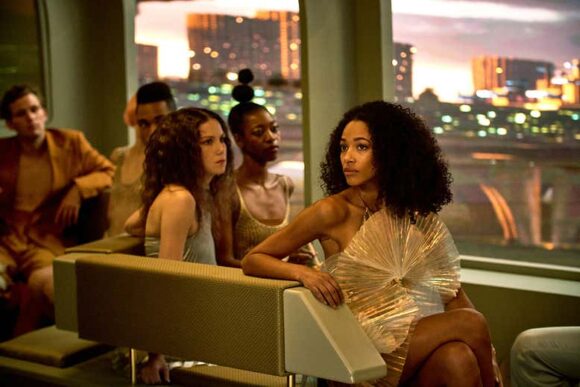Watching UCP/Amblin’s production of Brave New World for New Scientist, 15 July 2020
THE 20th century produced two great British dystopias. The more famous one is 1984, George Orwell’s tale of a world unified into a handful of warring blocs run by dictators.
The other, Brave New World, was written in the space between world wars by the young satirist Aldous Huxley. It had started out as a send-up of H. G. Wells’s utopian works – novels such as Men Like Gods (1923), for instance. Then Huxley visited the US, and what he made of society there – brash, colourful, shallow and self-obsessed – set the engines of his imagination speeding.
The book is Huxley’s idea of what would happen if the 1930s were to run on forever. Embracing peace and order after the bloody chaos of the first world war, people have used technology to radically simplify their society. Humans are born in factories, designed to fit one of five predestined roles. Epsilons, plied with chemical treatments and deprived of oxygen before birth, perform menial functions. Alphas, meanwhile, run the world.
In 1984, everyone is expected to obey the system; in Brave New World, everyone has too much at stake in the system to want to break it. Consumption is pleasurable, addictive and a duty. Want is a thing of the past and abstinence isn’t an option. The family – that eternal thorn in the side of totalitarian states – has been discarded, and with it all intimacy and affection. In fact, no distinct human emotion has escaped this world’s smiley-faced onslaught of “soma” (a recreational drug), consumerism and pornography. There is no jealousy here, no rage, no sadness.
The cracks only show if you aspire to better things. Yearn to be more than you already are, and you won’t get very far. In creating a society without want, the Alphas have made a world without hope.
Huxley’s dystopia has now made it to the small screen. Or the broad strokes have, at least. In the series, Alden Ehrenreich – best known for taking up the mantle of Han Solo in Solo: A Star Wars story – plays John. Labelled a “savage” for living outside the walls of the World State, he encounters the Alpha Bernard Marx (Harry Lloyd) and Lenina Crowne (Jessica Brown Findlay), his Beta pal.
Bernard and Lenina are vacationing in Savage Lands, a theme park modelled a little too closely on Westworld in which people act out the supposedly sinful values of the old order for the entertainment of tourists. It is while they settle into their hotel room at the park that Lenina and Bernard suddenly realise they want to be alone together – a shockingly dirty idea in a world that has outlawed monogamy and marriage – and that “it could be our wedding night”.
“In Huxley’s book, characters were given a hard choice between freedom and happiness”
“We’re savages,” gasps Lenina, as it dawns on the two what they actually want. It is a scene so highly charged and sympathetically played that you only wish the rest of the show had lived up to it. The problem with Brave New World is that it is trying to be Huxley’s future in some scenes and trying to be our future in others. The two do not mix well.
Some of Huxley’s ideas about the future loom over us still. The potential eugenic applications of CRISPR gene editing keep many a medical ethicist awake at night. In other respects, however, Huxley’s dystopia has been superseded by new threats. Artificial intelligence is changing our relationship with expertise, so who needs human Alphas? At the other end of the social scale, Epsilons would struggle to find anything to do in today’s automated factories.
Squeezed by our technology into middle-ranking roles (in Huxley’s book, we would be Betas and Gammas), we aren’t nearly as homogenous and pliable as Huxley imagined we would be. Information technology has facilitated, rather than dampened, our innate tribalism. The difference between the haves and have-nots in our society is infocentric rather than genetic.
In Huxley’s book, the lands left for those deemed savages featured an unreconstructed humanity full of violence and sorrow. Characters were given a hard choice between freedom and happiness. None of that toughness makes it to the screen. At least, not yet.
The TV series is a weirdly weightless offering: a dystopia without lessons for the present day. It is as consumable and addictive as a capsule of soma, but no more nutritious.



